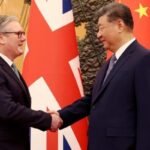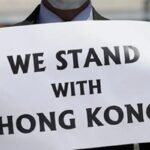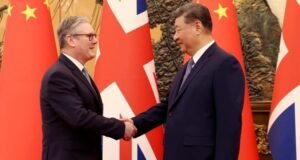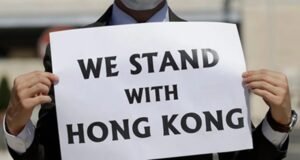
In 1971, did the United Nations resolve that the People’s Republic of China has a right to grab the Republic of China?
Several U.S. Senators have introduced a resolution to support the Republic of China and oppose the PRC’s use of UN Resolution 2758 to rationalize its claim to the ROC (“US lawmakers introduce resolution protesting China’s claim over Taiwan,” Taiwan News, February 23, 2025).
UN Resolution 2758 asserts that “the representatives of the Government of the People’s Republic of China are the only lawful representatives of China to the United Nations and that the People’s Republic of China is one of the five permanent members of the Security Council.” And:
Decides to restore all its rights to the People’s Republic of China and to recognize the representatives of its Government as the only legitimate representatives of China to the United Nations, and to expel forthwith the representatives of Chiang Kai-shek from the place which they unlawfully occupy at the United Nations and in all the organizations related to it.
The studied evasiveness and ambiguity of this majority-approved text, the implication that there is only a leader and some other people on Taiwan and not a country there, and the effect of giving Red China a perch in the UN while ejecting the other China could only embolden the misnamed People’s Republic and help other country governments live with submitting to PRC aims and assertions. Top PRC-appeaser Nixon was worried about the consequences of an “isolated China” but not about the consequences of a U.S.-enabled and world-enabled China.
Tricking, subverting, revising
In 2025, Senator Jim Risch says that “America does not recognize China’s claim over Taiwan. Once again, the Chinese government has attempted to trick the world and subvert the United Nations for its own purposes. But we see these malign tactics and stand in support of our friends in Taiwan.”
Senator Pete Ricketts says that “Communist China’s pressure campaign for its ‘One China principle’ has one goal—international backing to isolate, coerce, and, potentially, invade Taiwan. We must firmly reject Beijing’s strong-arming and revisionist history while supporting Taiwan’s meaningful participation and engagement on the world’s stage.”
Senator Jeanne Shaheen says that Resolution 2758 “does not define Taiwan’s political status, does not dictate how countries can engage with Taiwan and should not prevent Taiwan from meaningfully participating in UN bodies, full stop. The United States, our partners, and the UN must oppose the Chinese Communist Party’s coercive tactics regarding sovereign nations’ treatment of Taiwan and its deliberate distortion of international resolutions to undermine Taiwan’s support around the world.”
The proposed new U.S. resolution states in part, following a long list of Whereases, that “the longstanding ‘one China policy’ of the United States does not affirmatively recognize the People’s Republic of China’s claim to control over Taiwan and its outlying islands, but rather ‘acknowledges’ this position…, ‘has not agreed to take any position regarding sovereignty over Taiwan,’ and ‘will not exert pressure on Taiwan to enter into negotiations with the PRC’;
(2) reaffirms that the “one China policy” of the United States and the similar policies of its partners are not equivalent to the ‘One China Principle” of the Chinese Communist Party;
(3) emphasizes that the United Nations General Assembly Resolution 2758 is not equivalent to, and does not endorse, the PRC’s “One China Principle”;
(4) emphasizes further that Resolution 2758 does not take a position on Taiwan’s ultimate political status, as explicitly recognized by PRC leaders at the time, and does not represent a United Nations consensus on Taiwan’s status….
Risch et al. are right that the mealymouthed Resolution 2758 is not literally the equivalent of and does not literally endorse the One China Principle and “does not take a position on Taiwan’s ultimate” or current “political status,” etc.
But 2758 is about an inch or two away from endorsing the PRC position and says nothing against it. Contending that “We have no idea whether the Republic of China is a country” and expelling this maybe-a-country-maybe-not from the UN are not a doctrine and policy calculated to undermine the PRC’s claim that what the ROC calls the ROC is in no way a country, just a region of compatriots awaiting reunion with the mainland on the mainland’s terms. Resolution 2758 is not a clarion affirmation of truth.
What about other countries?
Suppose there were a series of UN resolutions that made a point of being agnostic and evasive about the country status of France, Germany, the United States, Japan, Luxembourg, Uganda, etc. What would be the motive and consequence? Only to appease and encourage whatever UN-cowing entity is denying that these countries are countries.
The PRC’s hope of conquering the ROC and various rationalizations for doing so must be repudiated. And UN Resolution 2758 must be repudiated, not merely “explained” and accepted in its own hedging and obfuscatory terms. The proposed new U.S. resolution does about half the required job.
Also see:
StoptheCCP.org: What Is This “Republic of China”?
“Communist conquest of the mainland did not settle the struggle with the ROC, and this can be felt in the frustration Beijing displays in its threats and incursions.”











